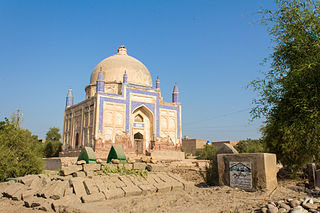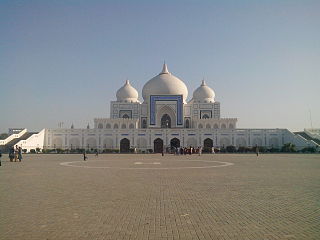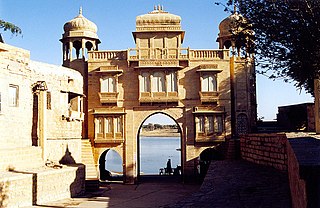
Bhil or Bheel refer to the various indigenous groups inhabiting western India, including parts of Rajasthan and Madhya Pradesh and are also found in distant places such as Bengal and Tripura. They speak various dialects of regional Indo-Aryan languages, collectively referred to as the Bhil languages, while the indigenous non-Indo-Aryan language that the Bhil originally spoke is lost. Bhils are divided into a number of endogamous territorial divisions, which in turn have a number of clans and lineages.
Bhutto is a Sindhi clan found in Sindh, Pakistan. The Bhuttos along with Bhattis and other subclans are said to be a branch of the Bhati Rajputs. They have been settled in Sindh for over two centuries, having migrated to the area from Jaisalmer in Rajasthan, India under Setho Khan Bhatti in the seventeenth century. According to other authors, the family migrated to Sindh from Sarsa in Hissar. The politically influential Bhutto family of Pakistan hails from this clan.
Shah Nawaz Bhutto, 8 March 1888 – 19 November 1957, was a politician and a member of Bhutto family hailing from Larkana in the Sind region of the Bombay Presidency of British India, which is now Sindh, Pakistan.

Bhati is an ancient warrior clan of Rajputs which claims descent from a common ancestor, Rao Bhatti. The Bhati clan historically ruled over several cities in present-day Pakistan and India, with their final capital and kingdom being Jaisalmer, India. The Punjabi inflection of the word is Bhatti.
Soomro, Soomra,Sumrah or Sumra is a tribe having a local origin in Sindh. They are found in Sindh, parts of Punjab especially bordering Sindh, Balochistan province, and the Kutch district of the Indian state of Gujarat and also Rajasthan. The Soomras ruled throughout the Sindh and Multan regions.

Ratodero is the capital of Ratodero Taluka, a sub-division of Larkana District in the Sindh province of Pakistan. Situated some 28 km from the district capital Larkana. Since the independence of Pakistan, the city is known for its sweet products and handmade caps known as Sindhi topi. At present the principal trade of the town is that of paddy and rice, with many rice mills located here.

Larkana District is a district of the Sindh province of Pakistan. Its largest city is Larkana, which sits on the banks of the Indus River. It is the home district of the influential Bhutto family.

The Bhutto family is a Pakistani political family. The Bhuttos have played a prominent role in Pakistani politics and government. The family has held the leadership of the Pakistan People's Party (PPP), since its inception in 1967. The Bhuttos have been settled in Sindh for over three centuries.
The Gurjar are an agricultural ethnic community, residing mainly in India, Pakistan, and Afghanistan, divided internally into various clan groups. They were traditionally involved in agriculture, pastoral and nomadic activities and formed a large heterogeneous group. The historical role of Gurjars has been quite diverse in society: at one end they have been founders of several kingdoms and dynasties and, at the other end, some are still nomads with no land of their own.
Naudero, also spelled Naundero, Nodero is a town and union council of Ratodero Taluka in the Larkana District, Sindh, Pakistan. The union council also includes the village of Garhi Khuda Bakhsh. It lies to the northwest of the district capital Larkana, connected by road. Irrigated by canals, the area is noted for its rice production. A sugar mill has been constructed in the area, funded by the Chinese. Asif Zardari held a press conference in the town two days after Benazir Bhutto's murder, accusing the Pakistan Muslim League (Q) party leadership of people responsible for her murder. Her grave and that of her father's Zulfiqar Ali Bhutto are located in Naudero.
Ratodero Tehsil is a tehsil, located in the Larkana District in the Sindh province of Pakistan. It is about 28 km from the district capital Larkana. Before the partition of India, the city had a special reputation for its sweet products.

Jaisalmer state is a region of Western Rajasthan state in western India. It lies in the southern part of Thar Desert.
The Sindh-Sipahi are a community of Muslim Rajputs, found in the province of Sindh in Pakistan and state of Rajasthan in India.
The Pal, Paluh, or Palh is a Sindhi Sammat tribe of Sindh province, Pakistan, in parts of Punjab bordering Sindh, also in Balochistan province, and also found in the Rajasthan of India. There is a railway station in Sindh, Hyderabad Badin line named after the name of Palh, Palh railway station.
The Warya is a Rajput and Jat clan found predominantly in the Punjab and Sindh provinces of Pakistan and in the state of Gujarat in India.
The Orh (pronounced [oᶑ]: Sindhi: اوڏ, Urdu: اوڈ) is a drifting tribe of labourers in Sindh,Gujarat, Kathiawar, and some parts of Rajasthan. They drift and shift lock, stock, and barrel with their families wherever work is to be done. They are said to hold a variety of occupations. As artisans, they are carpenters, masons and stoneworkers and were considered to be Dalits. As traders, they deal in grain, spices, perfumes, and cloth. They are spread across 40 villages in Uttarakhand and Uttar Pradesh. In reality, Odh is a word for people who built mud huts rather than a caste; yet, but it is used as a caste in Pakistan. They claim their original name was Sagarbansi or Sagarvanshi they bear surnames like Gadahi, Bhagat, Galgat, Kharwar, Kahlia, Kudavali, Maangal, Majoka, Mundai, Sarvana, and Virpali.
Sodha is a Rajput clan residing in India and Pakistan.
Bhatti is a Punjabi and a Sindhi caste of Rajputs. and Jats. The name Bhatti is a Punjabi form of Bhati, and they along with Bhuttos and Bhatias claim to have originated from the Hindu Bhati Rajputs. The Bhati/Bhatti Rajputs, are descended from a common ancestor, Rao Bhatti, a 3rd-century Hindu monarch.

Rajper, or Rajpar, is a Sindhi Rajput tribe and subclan "nukh" of Samma Rajputs in Sindh, Pakistan. They are descendants of Jam Hothi son of Unar, Whereas in another tradition they are mentioned as descendants of Thebo son of Unar. Rajper literally means "Son of Raja (King)".
The Sodhas of Amarkot were a Rajput dynasty who ruled Amarkot, which is now located in the Sindh province of Pakistan. The Sodha Rajput clan are a branch of the Parmar clan of Rajputs, as they are an off-shoot of Parmara Rajputs, who once controlled regions of Malwa and later North-West parts of Rajasthan. The kingdom was known for giving refuge to Mughal emperor Humayun, after he was fleeing from the forces of Sher Shah Suri, hence Akbar was born in the kingdom of Amarkot.






